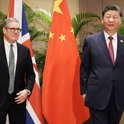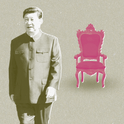I recently met with the Minister for re-integration, Yakobashvili, a large man bearing a resemblance to Luciano Pavarotti. His now thankless task is to re-integrate Abkhazia and South Ossetia, and he believes this is still possible notwithstanding Russia's recognition of the independence of these regions following the Russo-Georgian War. He beckoned me into his office with a wave of the hand and said "welcome to occupied Georgia." But Tbilisi doesn't have the feel of a city that until two weeks ago was under martial law. Being in the marchlands between super-powers has hardened the Georgians, whose characteristic melancholy has left them resigned to such clashes. They say Russian intimidation is a recurrent theme, they've always been subjected to it-- only last year Russia banned the import of Georgian products and froze the accounts of Georgians living and working in Russia, an economic blockade designed to destabilise the country and bring it into line with Kremlin policy. On the main road north from Tbilisi to Gori, within a half hour drive of the centre of Tbilisi, things are different. Here the signs of a Russian invasion are stamped into the road in the form of tank tracks. We passed the exit for Akhalgori, now in Russian-controlled South Ossetia—the locals tell us it will soon be renamed Leningori. On our approach to Gori, birthplace of Stalin, we pass blocks of flats that were bombed during the war—people are still living in the ones that were not gutted by shelling. Children are playing in the dust; contractors with minimal equipment struggle to rebuild before winter. An old man acts as our guide and tells us about those killed in the flats, and how he was thrown back ten feet by a cluster bomb. Describing in animated Georgian and waving his hands as he explains exactly how they explode. He said they were like Russian dolls, one big one and then lots of little ones inside.












